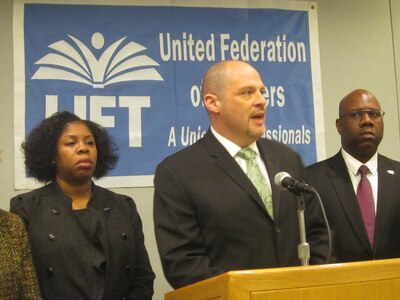
After months of warnings and weeks of grumblings about how New York City is rolling out its new teacher evaluation system, the United Federation of Teachers has filed its first set of official grievances against the implementation.
The grievances cover a wide range of issues, from how many people enter classrooms during observations, which make up 60 percent of teachers’ ratings, to how principals decided which assessments would be used to measure student growth. The union contends that on each count, practices that are widespread across the city violate what State Education Commissioner John King intended when he imposed New York City’s evaluation system back in June.
Complaints came in from so many teachers, chapter leaders, and union officials working directly with schools that they “met the criteria for being systematic,” UFT President Michael Mulgrew said.
The city now has 20 school days to respond, a union spokeswoman said. After which the union can take the grievances to arbitration, a labor process in which a neutral third party listens to both parties and imposes a resolution. The city does not always fare well in arbitration with the union: Earlier this year, an arbitrator ruled that the city had to extend overtime pay to union members who had used a glitchy special education data system, leading to a $40 million payout.
Proving that evaluations are being mishandled citywide would be less clear cut for the union, and a remedy would likely be harder to devise. But how the city is implementing evaluations for roughly 80,000 teachers working in nearly 1,700 schools has long been a concern. Both Mulgrew and state education officials have publicly worried about whether the Department of Education was equipped to ensure that the people in charge of carrying out the evaluations would be trained and prepared with details of the plan.
While the city argued against setting aside time to arbitrate procedural issues, such as the timing of observations, the union asked for 100 days of arbitration, which could allow for a thousand teachers to challenge their evaluations each year. King even granted individual teachers an extra set of slots — 150 allotted out over 15 days — for instances where there are disputes over the plan’s complexity.
Now that the city is six weeks into the school year, Mulgrew said his fears have been realized.
“It’s really been a mess,” said Mulgrew. “It’s been worse than we imagined.”
One of the grievances focuses on “the practice of multiple evaluators coming in at the same time to observe a teacher,” according to a letter that went out to union members on Friday. Mulgrew said he’d heard stories where evaluators took photographs of student work on the walls and talked to students about the teacher’s lesson, which he called a “complete” disruption.
Another grievance has to do with the committee of teachers that are required to make decisions about how teachers in individual schools should be measured on student learning for 20 percent of their ratings. Principals have final authority over some of the major decisions, but it is the committee’s responsibility to first submit a recommendation to a school’s administration. The grievance suggests that principals bypassed the committees entirely and made decisions without their input.
A third grievance is about principals who are requiring teachers to submit “written goals” for their professional growth in the classroom. The exchange takes place during an “initial pre-conference” meeting, which is where teachers decided what kind of observations they want. (King created two options.)
The department has warned principals not to request written goals unless their schools had opted into formal goal-setting as part of the evaluation process, raising questions about whether the department is intentionally allowing abuses to take place or whether the union is observing variation in implementation across the city.
The union has not yet released the full list of the grievances. The Department of Education did not respond to requests for comment.
A spokeswoman for the principal’s union, the Council of Supervisors and Administrators, said things have been going smoothly for the evaluation process of principals.
“We have weekly implementation meetings that are going well so far,” the spokeswoman said.
